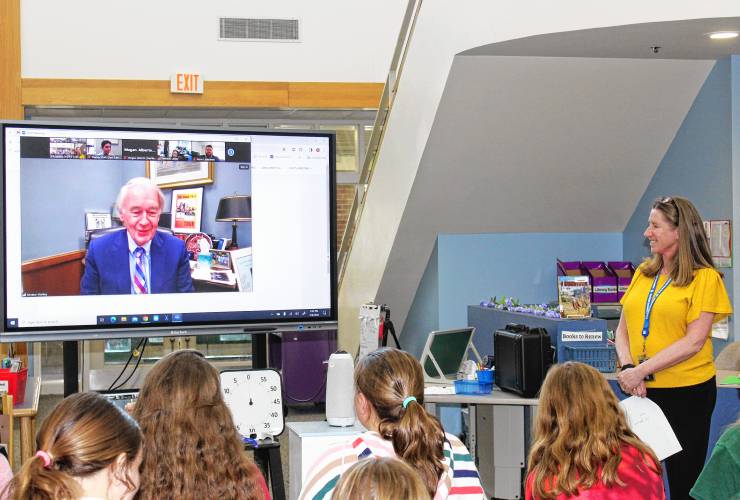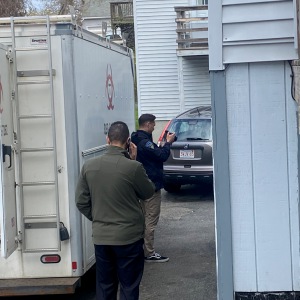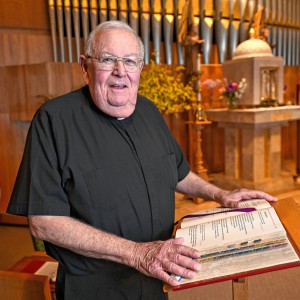Sen. Markey informs Deerfield Elementary students about online privacy law

U.S. Sen. Ed Markey appears on a screen in Deerfield Elementary School’s library to speak with 52 sixth graders about proposed legislation that would update the Children’s Online Privacy Protection Act (COPPA), which he originally authored in 1998. STAFF PHOTO/DOMENIC POLI
| Published: 04-09-2024 12:40 PM |
SOUTH DEERFIELD — Fifty-two students coming of age during a time enveloped by social media and online influence spoke with U.S. Sen. Ed Markey on Monday to discuss proposed legislation that would update a law enacted 26 years ago to better protect children on the internet.
Sixth graders at Deerfield Elementary School had a virtual meeting with Markey and his staffers to ask questions about the proposed Children’s Online Privacy Protection Act (COPPA) 2.0, which aims to strengthen protections related to online data collection, use and disclosure of the personal information of children and teenagers. The conversation was part of a long-term community-engaged research partnership between the school and the University of Massachusetts Amherst Department of Communication.
Markey, COPPA’s original author in 1998, said the legislation is meant to regulate “the companies that gather all the information and then use it to target advertisements to young people,” he said via Zoom.
Some students asked questions, including about what COPPA 2.0’s new layer of protection will be and how the law would be enforced. Danny Vinik, one of Markey’s legislative aides, said some companies have “an insatiable appetite” for collecting money from children and teens, and this law would ban advertising targeted at them. Markey said regulation would be handed over to the Federal Trade Commission and companies that violate the law could “be sued for hundreds of millions of dollars.”
If the bill is signed into law, it would increase from 13 to 16 the age covered by COPPA. When asked how this age was selected, Markey said he would like it to be “much higher” but it was the result of a bipartisan compromise. He mentioned many websites require users to enter their birth year to gain access, and others collect data that helps determine a user’s age.
“The data kind of builds on itself,” Vinik said.
UMass Amherst communication scholars have created lesson plans for the Deerfield Elementary sixth graders detailing how data is collected online and used to send targeted ads to internet users. The lessons include an introduction to the COPPA legislation from 1998 as well as the proposed changes under COPPA 2.0. The students will also create infographics, posters or brochures on data privacy and personalized online ads to demonstrate what they have learned and to inform others.
Reach Domenic Poli at: dpoli@recorder.com or 413-930-4120.
Article continues after...
Yesterday's Most Read Articles
 Authorities ID victim in Greenfield slaying
Authorities ID victim in Greenfield slaying
 State records show Northfield EMS chief’s paramedic license suspended over failure to transport infant
State records show Northfield EMS chief’s paramedic license suspended over failure to transport infant
 Police report details grisly crime scene in Greenfield
Police report details grisly crime scene in Greenfield
 On The Ridge with Joe Judd: What time should you turkey hunt?
On The Ridge with Joe Judd: What time should you turkey hunt?
 ‘I have found great happiness’: The Rev. Timothy Campoli marks 50 years as Catholic priest
‘I have found great happiness’: The Rev. Timothy Campoli marks 50 years as Catholic priest
 Formed 25,000 years ago, Millers River a historic ‘jewel’
Formed 25,000 years ago, Millers River a historic ‘jewel’

 What are the protocols for emergency transport of infants?
What are the protocols for emergency transport of infants?
